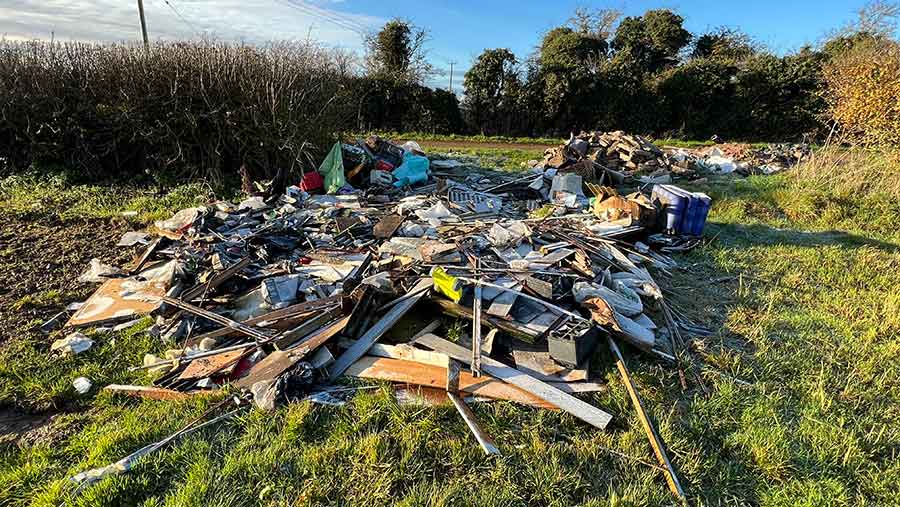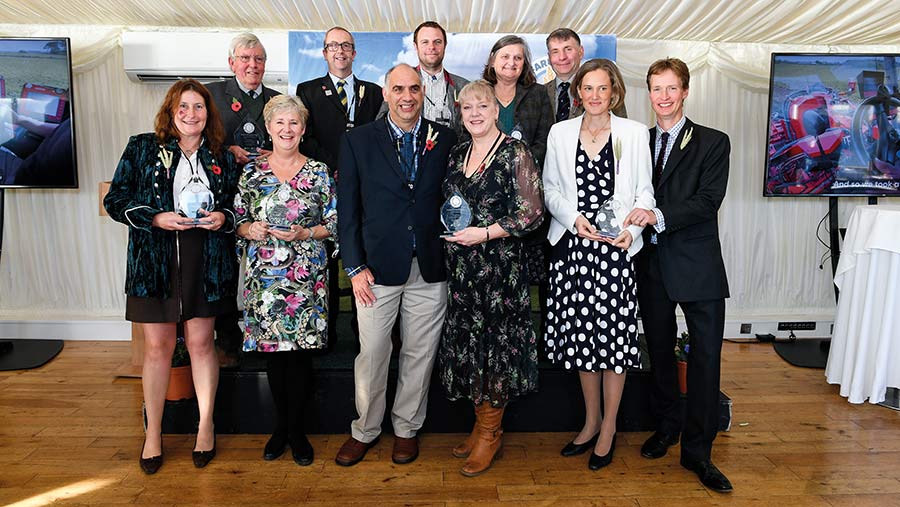2022: What made the farming news in November and December?
 Fly-tipping on Andrew Ward's farm © Andrew Ward
Fly-tipping on Andrew Ward's farm © Andrew Ward Our review of 2022 agricultural news continues with a look at November and December.
Big stories included food security and a report showing farmers lose out in supply chain.
See also: Photo of the Week: Mini farmer joins NFUS rally
November
NFU’s Back British Farming Day
Farmers and growers who have gone the extra mile for their local community and beyond were celebrated on the NFU’s Back British Farming Day on Wednesday 2 November.
A total of 115 farmers and growers were nominated by their MPs and became constituency winners of the inaugural NFU Community Farming Hero award.
Eight regional winners were then chosen by a panel of NFU leaders and presented with their awards at the House of Commons in London.

© Miranda Parry Photography
Scottish farmers’ rally
More than 400 farmers and crofters sent a clear message to the Scottish government that it must place food production at the heart of future agricultural policy.
They travelled to Edinburgh from across the country to give their support to NFU Scotland’s “Food Needs a Farmer” rally, which took place outside the Scottish parliament on Wednesday 2 November.
Rural road safety
Farm groups called for an urgent safety review of countryside driving following a sharp rise in the number of deaths and serious injuries reported on rural roads in England, Scotland and Wales.
In 2021, there were 70% more fatalities on rural roads (981) than urban roads (576), despite rural roads seeing about one-third fewer vehicles.
Greenhouse gas emissions
Red meat processing giant ABP set out its plan to help suppliers reduce their greenhouse gas emissions from beef and lamb production by as much as 25% by 2030.
The processor will work with 350 farms and with Harper Adams University on the £1.5m Prism 2030 programme of research.
Ways to reduce emissions could include goals on heifer age at first calving and age of animal at slaughter.
Eustice backlash
Former Defra secretary George Eustice faced an angry backlash from farmers after he admitted the Australia free-trade deal is “not actually a very good deal for the UK”.
Speaking in the House of Commons in a debate on the Australia and New Zealand deals, Mr Eustice said “the truth of the matter is that the UK gave away far too much for far too little in return”.
Some questioned why he had not resigned at the time.
Sprayer problems
Corteva Agriscience issued new best-practice guidelines to wheat growers, having completed a six-month investigation into problems associated with its Inatreq-based fungicide Univoq.
The agrochemical giant said no single factor had emerged as the root cause of the sprayer problems, adding that claims that Inatreq was the sole cause of the problems were “not proven”.
December
Shocking margins
Food and farming groups expressed their dismay at the wafer-thin margins being left for primary producers once everyone else in the food chain has taken their share of the cash.
A report from food and farming alliance Sustain, Unpicking Food Prices, demonstrated how margins across the whole food supply chain are tight.
For example, a pack of four beefburgers with a retail value of £3.50 returns a net profit of only 8.7p. The farmer’s share of that margin is absolutely minuscule.
RPA strike
Staff at the Rural Payments Agency were among those at several government departments that voted to strike over pay, pensions and other terms.
Their first industrial action was on 13-16 December, with further strikes planned for 19-23 December, as well as 3-6 and 9-13 of January.
Food a national security issue
The former head of MI5 warned that food production in the UK has been taken for granted for too long and now constitutes a national security weakness.
Baroness Manningham-Buller told the annual Henry Plumb Lecture that the government needed to urgently address the exceptional challenges facing farmers, including the lack of labour.
ELM delays
Defra secretary Therese Coffey angered farmers when she said there would be no further details of the standards and payment rates for the Sustainable Farming Incentive and “Countryside Stewardship Plus” until the new year.
The Country Land and Business Association warned that farmer confidence in Environmental Land Management was on the brink of “disappearing forever” due to the delays.
Fly-tipping
Lincolnshire arable farmer Andrew Ward accused the government of failing to do enough to tackle fly-tipping in the countryside after his farm was targeted once again.
Four loads of large-scale waste were dumped on his farm near Sleaford. It is the second time in two-and-a-half years that the same part of his farm has been damaged by industrial-scale waste.
Avian flu
Half of all free-range turkeys and geese grown on UK farms for Christmas had died or were culled due to avian influenza by mid-December.
Out of an estimated 1.3 million free-range birds on farms, 600,000 have been lost to the virus.
The effect is less severe for indoor systems, with about 1m mortalities among the 8.5-9 million birds destined for sale, Richard Griffiths, chief executive of the British Poultry Council, told a meeting of MPs.
